Top Market Intelligence Tools for Growth in 2025

Maxime Dupré
10/2/2025

In a market where intuition alone is a liability, winning businesses operate on a foundation of data-driven certainty. They possess a granular, real-time understanding of their customers, competitors, and the industry at large. This is the power of market intelligence tools: they are the essential instruments for modern strategy, converting vast seas of raw data into the actionable insights that drive growth, preempt risks, and reveal untapped opportunities.
Navigating the crowded landscape of these platforms, however, can be a challenge. How do you distinguish between a comprehensive data suite and a simple analytics dashboard? Which solution offers the specific insights your team needs without overwhelming them with irrelevant metrics? This guide is designed to provide clarity and cut through the noise.
We’ve compiled a definitive list of the top 12 market intelligence tools available today, from enterprise-grade financial intelligence platforms like S&P Global to agile competitor trackers like Semrush. Each entry includes a detailed breakdown of its core features, ideal use cases, and practical considerations to help you find the perfect fit. Complete with screenshots and direct links, this resource is your shortcut to making an informed decision and securing a decisive competitive advantage. We will explore platforms like ChampSignal, Similarweb, CB Insights, and others, ensuring you get a comprehensive view of the best solutions for founders, CTOs, and SMBs aiming to dominate their niche.
1. ChampSignal
Best For: Real-time, multi-channel competitor monitoring with AI-powered noise filtering.
ChampSignal stands out as a premier market intelligence tool specifically engineered for founders, CTOs, and SMBs who require high-signal, actionable insights without the manual effort. It excels at transforming the often-overwhelming task of competitor tracking into a streamlined, automated process. Its core strength lies in its ability to monitor a wide array of competitor activities and use AI-driven statistical outlier detection to surface only the most significant changes, ensuring you react to what truly matters.
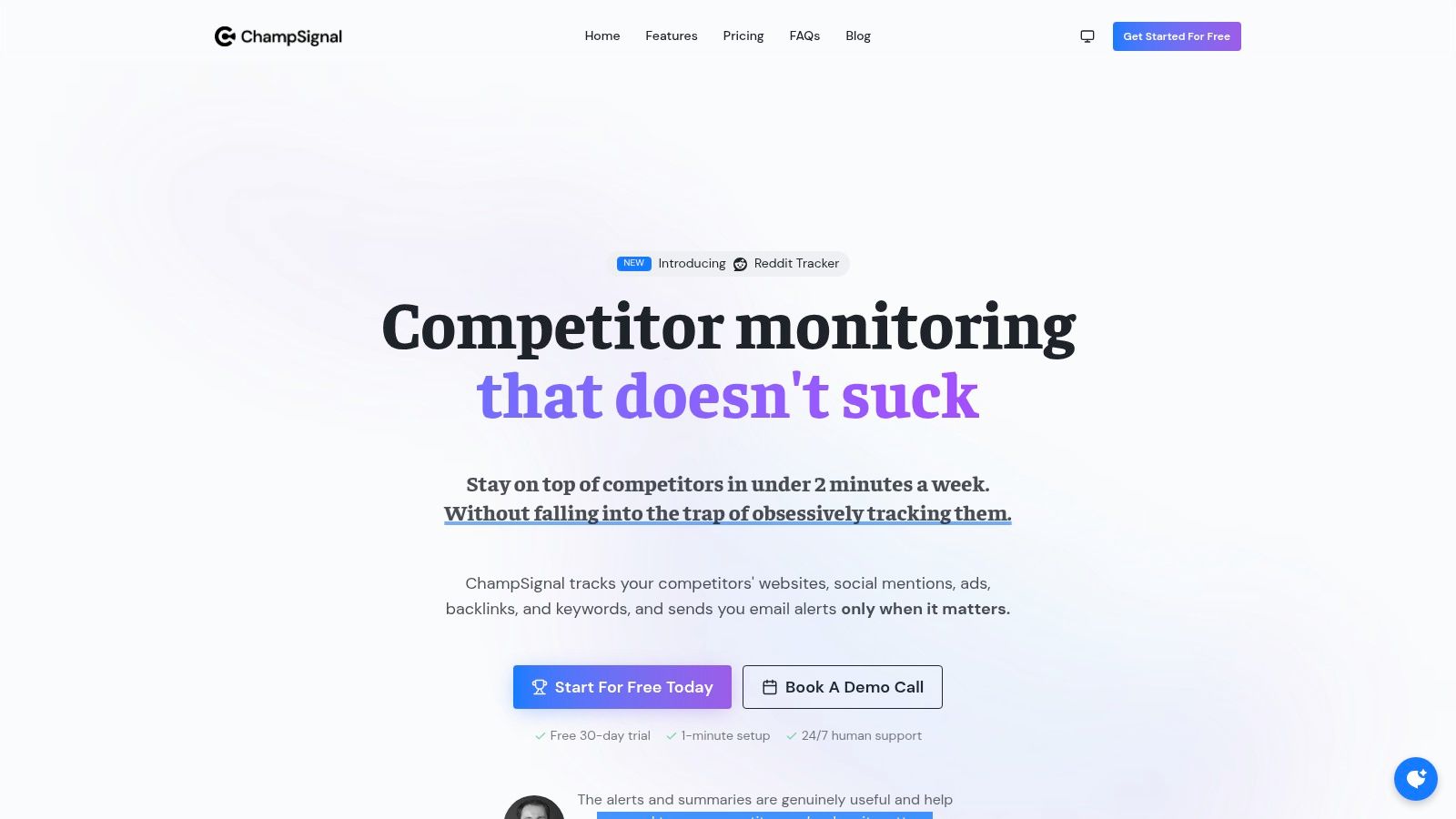
This platform moves beyond basic alerts by providing rich context. Instead of just noting a pricing change, it delivers a visual HTML diff and a screenshot, allowing you to see exactly what was altered. This level of detail is invaluable for strategic decision-making, whether you're adjusting your own pricing, refining your ad creative, or identifying a new market opportunity. The one-minute setup and centralized dashboard make it exceptionally accessible, removing the steep learning curve often associated with sophisticated market intelligence tools.
Standout Features & Use Cases
- AI-Powered Alert System: The platform’s proprietary AI filters out minor, irrelevant updates. This is crucial for busy teams that cannot afford to be distracted by noise. A practical use case involves monitoring a competitor’s new feature launch. ChampSignal will ignore minor bug fix updates but immediately alert you when a major new feature page is added, giving you a head start in your competitive response.
- Comprehensive Channel Monitoring: ChampSignal provides a holistic view by tracking:
- Website & Pricing: Get notified of new promotions, feature updates, or pricing structure changes.
- Reddit Conversations: Track brand mentions and sentiment in relevant subreddits to tap into authentic customer feedback.
- Google Ads & Backlinks: Analyze competitor ad strategies and see who is linking to them to uncover new marketing channels.
- Keyword Rankings: Monitor SEO performance to identify shifts in content strategy.
- Historical Data with Visual Context: The platform doesn't just tell you something changed; it shows you. Access to historical data with screenshot and HTML diffs is perfect for trend analysis and understanding the evolution of a competitor's strategy over time.
Practical Considerations
ChampSignal is designed for agility and ease of use. The user experience is clean, and the availability of 24/7 human support is a significant advantage for teams needing reliable assistance. While standard plans cap tracking at 10 competitors, this is typically sufficient for most SMBs focusing on their core market. For larger enterprises needing broader surveillance, custom solutions are available.
Pros:
- Rapid 1-minute setup and an intuitive, centralized dashboard.
- AI and statistical outlier detection deliver high-signal, actionable alerts.
- Comprehensive monitoring across websites, Reddit, Google Ads, backlinks, and keywords.
- Robust historical data with screenshots and HTML diffs for full context.
Cons:
- Standard plans are limited to 10 competitors, requiring custom plans for larger needs.
- Highly active competitor landscapes might still generate frequent notifications.
Pricing: Plans are scalable, starting with a free 30-day trial and a money-back guarantee, making it a risk-free choice for businesses looking to enhance their competitive intelligence capabilities.
Website: https://champsignal.com
2. Similarweb
Similarweb is a dominant player in the digital market intelligence landscape, offering granular insights into website and app performance. It excels at providing a comprehensive view of your digital ecosystem, allowing you to benchmark against competitors with remarkable precision. This platform is more than just a traffic estimator; it's a strategic tool for dissecting online behavior and identifying growth opportunities.
The platform’s strength lies in its ability to deconstruct a competitor's digital strategy. You can analyze their traffic sources (Direct, Referral, Search, Social, etc.), identify top referring sites, and even see which keywords are driving the most organic and paid traffic. This level of detail is invaluable for marketers looking to refine their channel mix or for founders sizing up a market. For instance, you can quickly identify a competitor's reliance on paid search and analyze their ad copy for inspiration.
Key Features & Use Cases
- Competitive Benchmarking: Track your market share and growth rate against key competitors. Use the "Compare" feature to see a side-by-side analysis of traffic, engagement metrics (like bounce rate and time on site), and audience geography.
- Channel Performance Analysis: Understand which digital channels are most effective for others in your industry. If a competitor is getting significant traffic from referrals, you can dig deeper to see the source domains. This analysis can inform your partnership and backlink strategies; understanding how to analyze competitor backlinks is a crucial next step.
- Audience Insights: Uncover audience demographics and interests, helping you verify if you're reaching your target persona or if there are new segments to explore.
Pricing & Access
Similarweb operates on a freemium model. Its free tools offer limited data, but paid plans (Starter, Professional, and Enterprise) unlock deeper historical data, country-level filtering, and more advanced features like segment analysis. A free trial is available for the Starter plan, providing a good entry point for SMBs to evaluate its capabilities.
- Pros: Broad coverage of websites and mobile apps, intuitive user interface, and clear self-serve pricing tiers.
- Cons: Access to granular, long-term historical data and specific country filters is reserved for higher-priced plans, which can be a limitation for businesses on a tight budget.
3. S&P Global Market Intelligence (Capital IQ Pro)
S&P Global Market Intelligence is an enterprise-grade powerhouse, providing deep financial data and sophisticated analytics for professionals in corporate development, investment management, and private equity. Its Capital IQ Pro platform offers an incredibly detailed view of public and private companies, entire industries, and macroeconomic trends. This is one of the most comprehensive market intelligence tools available, moving beyond web traffic to deliver fundamental financial health and corporate structure data.
The platform distinguishes itself with its extensive coverage of fixed-income and loan pricing data, which is critical for complex financial modeling and risk assessment. Its recent integration of generative AI features, such as document summarization and chart explainers, helps users quickly distill complex information. This allows analysts to spend less time sifting through reports and more time deriving strategic insights from the data provided.
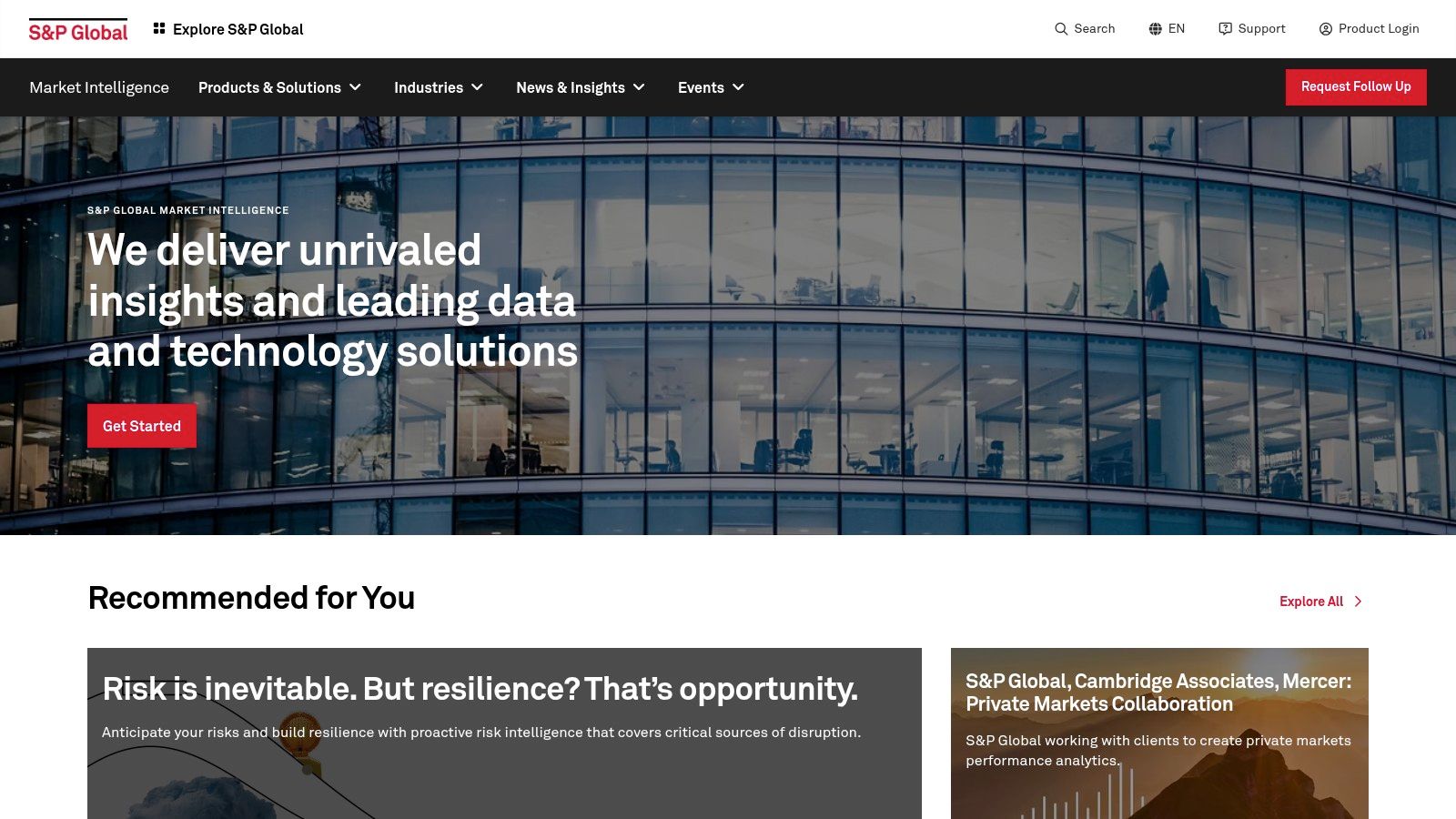
Key Features & Use Cases
- Deep Company Analysis: Access detailed financial statements, transaction histories, executive profiles, and supply chain data for millions of companies worldwide. This is ideal for M&A due diligence, competitive landscaping, and identifying investment opportunities.
- Sector and Macroeconomic Research: Utilize industry-specific data, research reports, and economic indicators to understand market dynamics and forecast future trends. This supports strategic planning and market entry analysis. While distinct, some functionalities overlap with those discussed in a business intelligence tools comparison, particularly in data visualization.
- Credit Risk Assessment: Leverage extensive fixed-income and loan data to evaluate the creditworthiness of companies and counterparties, which is essential for financial institutions and corporate treasurers.
Pricing & Access
S&P Global operates on a custom pricing model tailored to enterprise needs, with costs reflecting the depth of data and number of users. Access is available via desktop, web, and a dedicated mobile app. Due to its premium nature, it is primarily suited for organizations with significant budget allocations for market intelligence.
- Pros: Extremely comprehensive data coverage across asset classes and industries, 24/7/365 customer support, and robust enterprise-level delivery options.
- Cons: Pricing is typically at an enterprise level and not suitable for small businesses; the platform's complexity can present a steep learning curve for new users.
4. Statista
Statista is a go-to platform for market and consumer data, consolidating a massive repository of statistics, reports, and forecasts from thousands of sources. It excels at providing quick, verifiable data points that are essential for validating market size, understanding industry trends, and enriching presentations or reports. Instead of spending hours scouring disparate sources, users can find presentation-ready charts and datasets on virtually any industry imaginable.
The platform’s core value lies in its accessibility and breadth. For founders building an investor pitch or a marketing team crafting a data-driven campaign, Statista offers a shortcut to credibility. You can quickly find statistics on consumer behavior, technology adoption rates, or economic forecasts for specific countries. This makes it an indispensable tool for initial market research, competitive analysis, and strategic planning, providing the hard numbers needed to back up your business hypotheses.
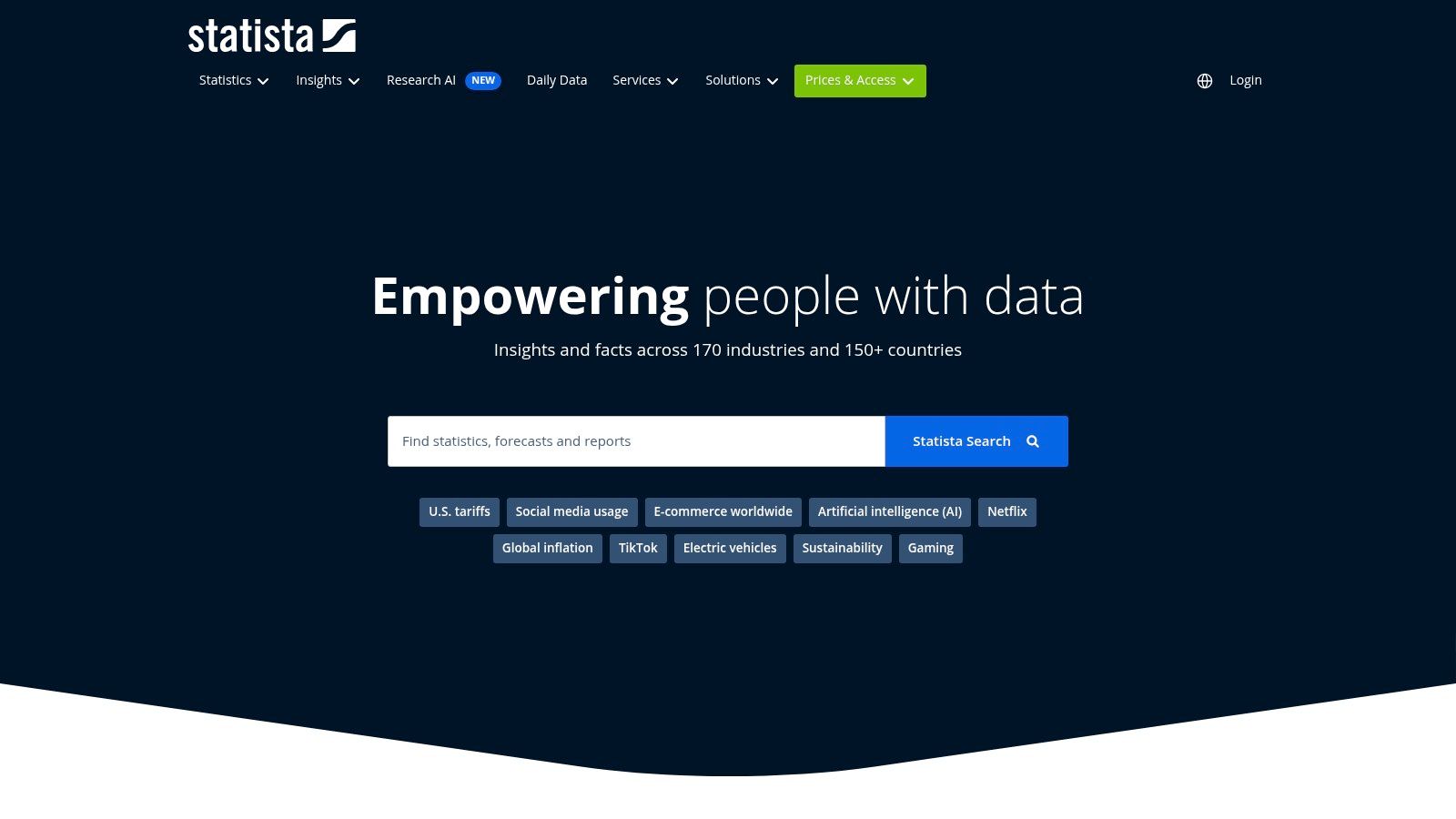
Key Features & Use Cases
- Market Sizing & Validation: Use the platform’s extensive collection of industry reports and market forecasts to quickly estimate the size of a potential market or validate a business idea. This is crucial for early-stage startups seeking funding.
- Content & Presentation Enrichment: Download charts and statistics in various formats (PNG, PPT, XLS) to add authoritative data to your marketing content, internal presentations, or business plans. The sourcing is always clear, adding credibility to your work.
- Consumer Behavior Analysis: Explore dossiers and survey data to understand consumer trends, purchasing habits, and brand perception. This insight can directly inform product development and marketing messaging.
Pricing & Access
Statista provides several tiers, starting with a free Basic account that offers access to a limited selection of public statistics. Paid plans like the Starter and Business Suite unlock full access to the platform's premium datasets, reports, and advanced export functionalities. Enterprise-level plans offer API access and customized research services.
- Pros: Enormous database of curated, presentation-ready data, clear sourcing for all statistics, and an intuitive interface that makes finding information straightforward.
- Cons: A free account is quite limited, and commercial usage rights or access to in-depth expert dossiers and reports require a more expensive subscription.
5. CB Insights
CB Insights is a premier market intelligence platform focused squarely on the private company and emerging technology landscape. It moves beyond simple traffic metrics to provide deep, predictive insights into new markets, venture capital trends, and corporate strategy. For founders and investors, it serves as a critical tool for mapping out competitive ecosystems, identifying nascent technologies, and understanding investment flows before they become mainstream news.
The platform's core strength is its proprietary data engine, which analyzes millions of unstructured documents like patents, earnings calls, and news articles to generate actionable intelligence. This allows users to spot disruptive companies and technology trends with a high degree of confidence. For instance, you can use its "Market Map" generator to visualize all players in a niche like "generative AI for legal tech," understand their funding stages, and identify key investors, providing a powerful strategic overview.
Key Features & Use Cases
- Emerging Tech & Trend Spotting: Use the platform's analytics to identify high-momentum startups and technology trends. The tool is invaluable for M&A teams, VCs, and corporate strategy professionals looking for their next acquisition or investment.
- Funding & Exit Analysis: Track real-time funding rounds, valuations, and M&A activity across any industry. This helps you benchmark your own company's fundraising efforts or understand the health and trajectory of a specific market sector.
- Comprehensive Company Data: Access detailed profiles on private companies, including funding history, investor syndicates, key executives, and proprietary "Mosaic" scores that predict company health. This is a core part of building a robust competitive intelligence framework for private markets.
Pricing & Access
CB Insights is an enterprise-grade platform with pricing to match. Access is typically granted through high-value, annual contracts, often starting around $60,000 per year. There is no free version or self-serve option; prospective customers must go through a sales demo and contract negotiation process to gain access.
- Pros: Unparalleled depth in private market and emerging tech data, and highly curated research that combines data with expert analysis.
- Cons: The high cost makes it inaccessible for most SMBs and early-stage startups, and the lack of a free or trial version prevents easy evaluation.
6. Crunchbase
Crunchbase is a powerhouse for private-company intelligence, tracking startups, funding rounds, and key personnel. It has evolved from a simple company database into a robust prospecting and market intelligence tool, offering predictive insights and powerful search capabilities. The platform is particularly valuable for identifying emerging competitors, tracking investment trends, and understanding the financial health of private companies.
Its unique strength lies in its comprehensive funding data and interconnected network of companies, investors, and founders. You can use it to build a map of an entire industry ecosystem, identifying key players, their financial backing, and recent M&A activity. This makes it an essential tool for founders seeking investment, sales teams building lead lists, or analysts assessing market saturation.
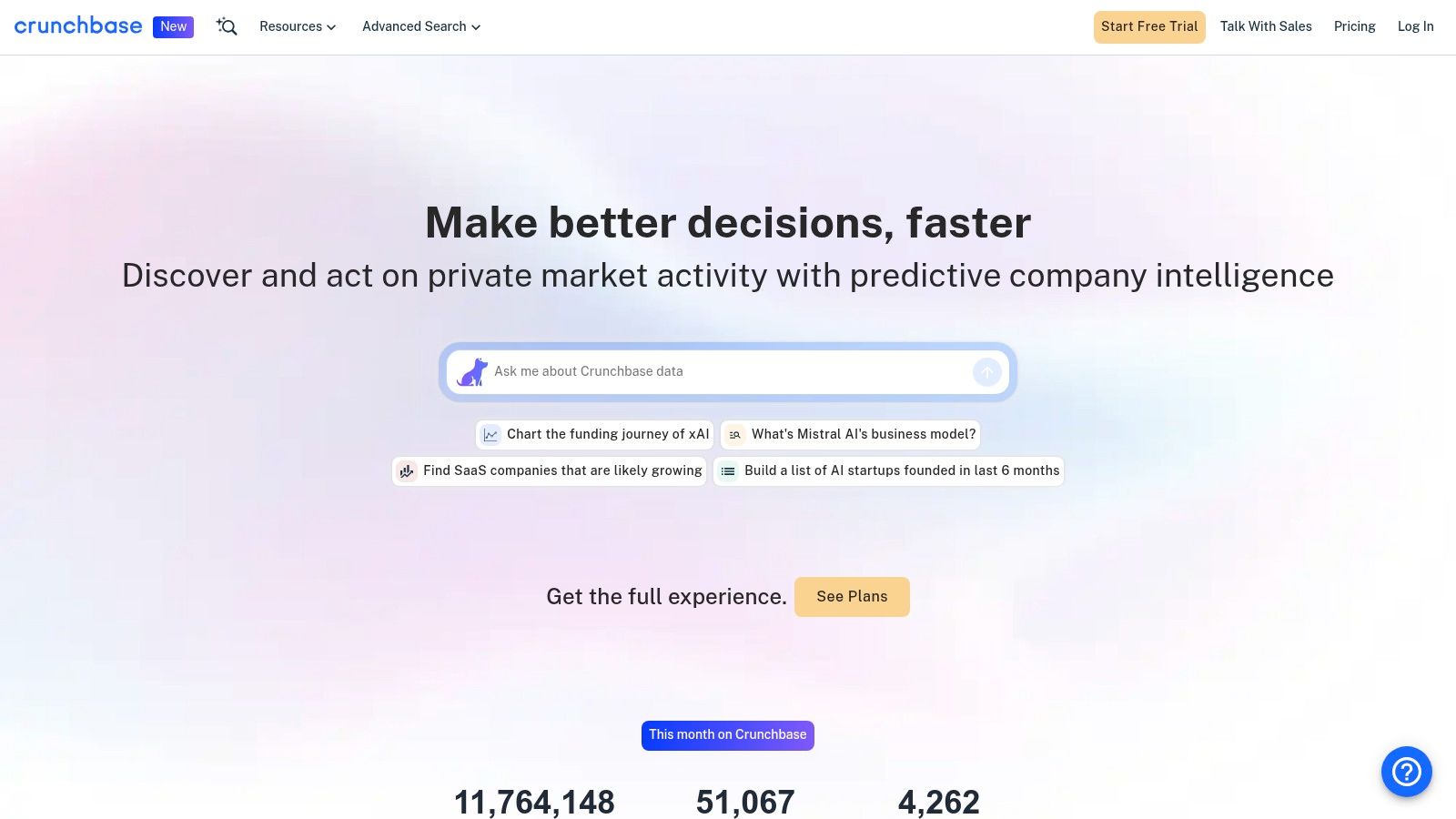
Key Features & Use Cases
- Competitive & Market Scanning: Use the advanced search to filter companies by industry, location, funding stage, and employee count. Set up alerts to get notified of new funding rounds or acquisitions involving your competitors.
- Prospecting & Lead Generation: Build targeted lists of potential customers or partners based on firmographic data. The Salesforce integration streamlines the process of exporting this data directly into your CRM for sales outreach.
- Fundraising & Investor Research: Identify active investors in your space, analyze their investment history, and find key contacts within venture capital firms. This helps founders create a highly targeted list of potential financial partners.
Pricing & Access
Crunchbase offers a tiered subscription model. A free version provides basic search access, but the real power is unlocked with paid plans. The "Pro" plan is a self-serve option ideal for individuals and small teams, offering advanced search, data exports, and alerts. For larger-scale operations requiring API access and deeper integrations, custom "Enterprise" packages are available.
- Pros: Transparent self-serve pricing and a user-friendly interface make it easy to get started. Highly effective for building lead lists for total addressable market (TAM) analysis and competitive scanning.
- Cons: The self-serve "Pro" plan has data export limits, and access to supplemental data like tech stacks requires paid add-ons. Large-scale data operations will require more expensive enterprise tiers.
7. PitchBook
PitchBook is a powerhouse in financial market intelligence, specializing in private capital markets. While many tools focus on public companies or digital signals, PitchBook provides deep, granular data on the entire private investment lifecycle, from venture capital and private equity to M&A. This makes it an indispensable resource for founders fundraising, VCs sourcing deals, or corporate development teams tracking acquisition targets.
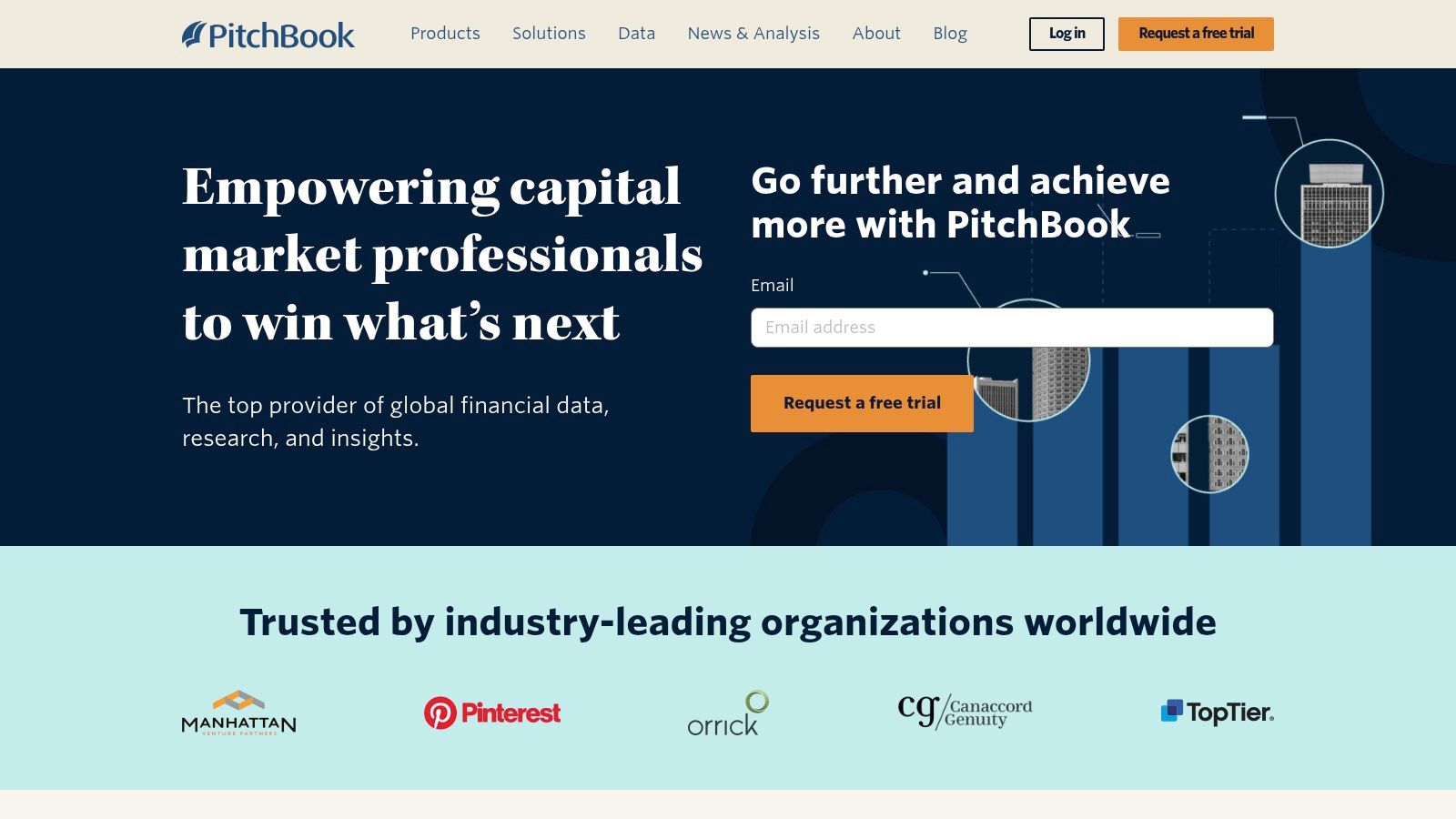
The platform’s core strength lies in its meticulously curated datasets on companies, investors, funds, and deals. You can build detailed searches to find investors who fund your specific niche, analyze the valuation history of a private competitor, or access analyst research on industry trends. Its Excel and PowerPoint plugins are particularly useful, allowing users to pull data directly into their financial models and presentations, which significantly streamlines fundraising and M&A workflows. PitchBook is one of the more specialized market intelligence tools focused on capital flows.
Key Features & Use Cases
- Fundraising & Investor Sourcing: Identify and vet potential investors by analyzing their portfolio, investment thesis, and recent funding activities. Founders can create highly targeted outreach lists based on past deals in their sector and stage.
- M&A and Competitive Analysis: Track merger and acquisition activity, identify potential acquisition targets, and analyze transaction multiples. Use its comprehensive company profiles to understand a private competitor’s funding history and cap table.
- Venture & Private Equity Intelligence: Access detailed information on fund performance, limited partners (LPs), and deal flow. This is crucial for GPs raising new funds or LPs conducting due diligence.
Pricing & Access
PitchBook does not offer a self-serve model or publicly listed pricing. Access is provided through custom quotes tailored to team size and specific data needs, which typically places it in the mid-size to enterprise budget range. They are known for providing extensive training and dedicated customer support to help users maximize the platform's value.
- Pros: Unrivaled depth in private market data, powerful search and filtering capabilities, and excellent analyst support and training resources.
- Cons: Premium pricing makes it inaccessible for most early-stage startups or small businesses; no free version or transparent pricing tiers.
8. Semrush (Traffic & Market Toolkit)
While widely known for its SEO and advertising capabilities, Semrush offers a powerful suite of add-on tools specifically designed for market intelligence. The Traffic & Market Toolkit (.Trends) integrates directly into its core platform, providing a seamless experience for existing users looking to expand their analysis from keywords and backlinks to broader market dynamics. This makes it an efficient choice for teams already embedded in the Semrush ecosystem.
The toolkit’s primary advantage is its ability to connect top-level market analysis with granular, actionable data. You can start with the Market Explorer to size up a new category, identify key players, and understand seasonal trends. From there, you can pivot directly into Traffic Analytics to deconstruct a competitor's channel strategy, see their top-performing pages, and analyze their audience's journey. This integrated workflow helps bridge the gap between high-level strategy and tactical execution.
Key Features & Use Cases
- Market Sizing and Share Analysis: Use the Market Explorer to get a bird's-eye view of an industry, including market size, growth trends, and the traffic share of top competitors. This is ideal for validating a new business idea or assessing expansion opportunities.
- Competitive Traffic Benchmarking: The Traffic Analytics tool allows for a direct comparison of website performance, showing estimated traffic, engagement metrics, and channel breakdowns (Direct, Search, Social, etc.). A common question for users of such platforms is how accurate is Semrush, especially when relying on its data for critical market intelligence decisions.
- Proactive Competitor Monitoring: With EyeOn, you can set up automated tracking for competitors' new content, promotional campaigns, and social media activity, ensuring you never miss a key strategic move.
Pricing & Access
The Traffic & Market Toolkit is available as a paid add-on to any core Semrush subscription (Pro, Guru, or Business). This structure means it cannot be purchased as a standalone product. Semrush offers a 7-day free trial for the add-on, allowing users to test its full capabilities before committing.
- Pros: Familiar user interface for existing Semrush subscribers, excellent integration with SEO/PPC workflows, and clear add-on pricing.
- Cons: Full data access requires a paid Semrush subscription plus the separate toolkit add-on, increasing the total cost.
9. data.ai (Sensor Tower)
For businesses operating in the mobile-first economy, data.ai (formerly App Annie, now part of Sensor Tower) is a cornerstone market intelligence tool. It provides a specialized, in-depth view of the mobile app ecosystem, moving far beyond simple website analytics to focus exclusively on app performance, downloads, revenue, and user engagement. This platform is essential for anyone whose primary business channel is a mobile application, from gaming studios to fintech startups.
The core value of data.ai lies in its granular app-centric data. You can accurately size up market opportunities within specific app categories, track the download and revenue performance of competitors in real-time, and analyze user demographics to refine your marketing. For instance, a product manager can use the platform to see which features in a competitor’s app are driving the most engagement or identify emerging app trends before they become mainstream.
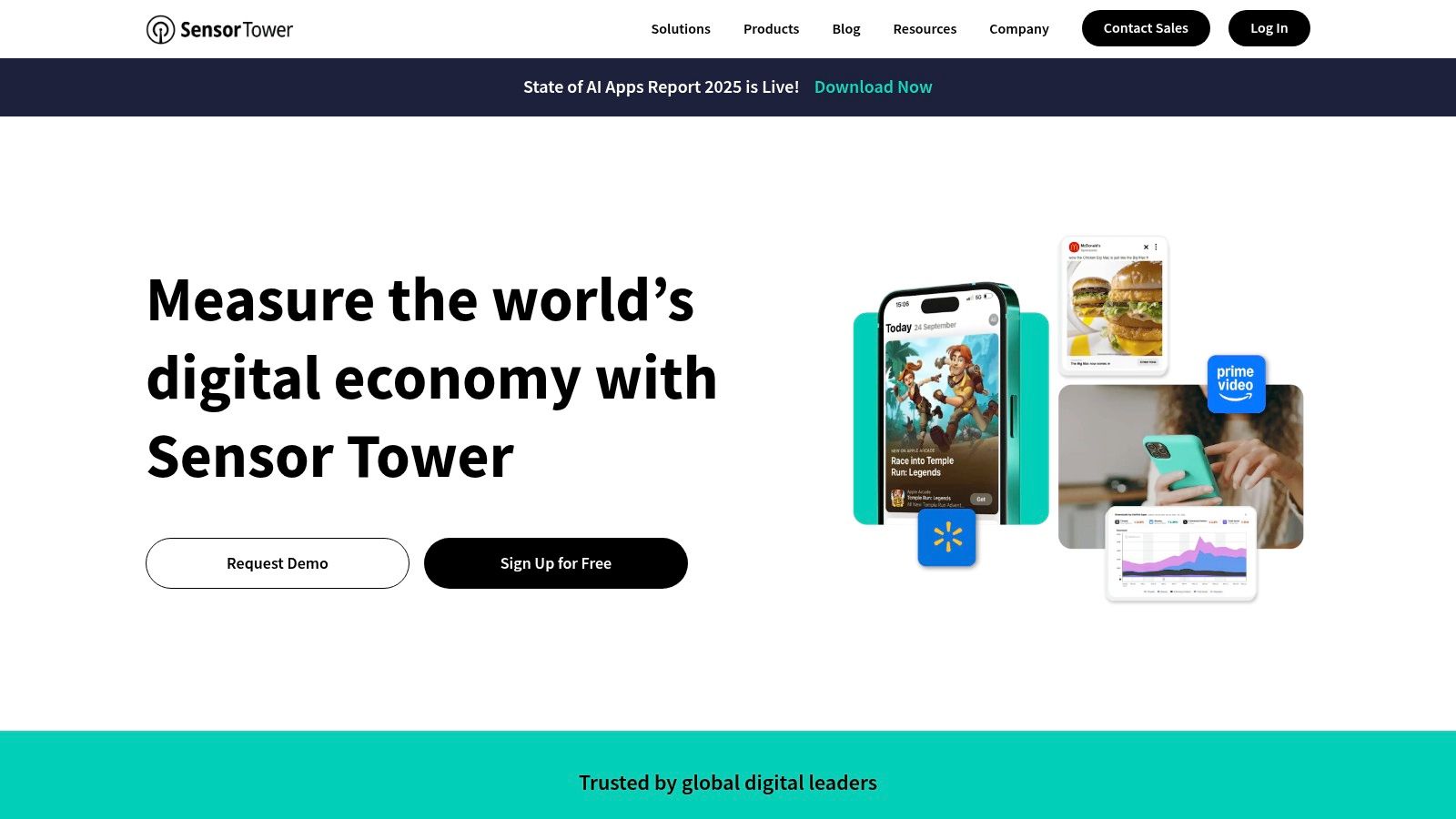
Key Features & Use Cases
- App Store Optimization (ASO): Identify top keywords for your app category, analyze competitor keyword strategies, and track your app's rank to improve visibility and organic downloads.
- Competitive Intelligence: Monitor competitor downloads, revenue estimates, and active user metrics. This helps you benchmark your performance and understand your market share within the mobile landscape.
- Market Sizing & Trend Analysis: Use store intelligence to evaluate the potential of new markets or app categories. Uncover breakout apps and identify consumer trends based on usage and engagement data.
Pricing & Access
data.ai operates on an enterprise-focused sales model. Pricing is not publicly listed and requires contacting their sales team for a custom quote based on your specific needs, such as the modules required (Store, Ad, Usage Intelligence) and data delivery methods. They offer a limited free account that provides a basic overview of top charts and app details, but deep competitive insights are reserved for paying customers.
- Pros: Unparalleled focus and depth on the mobile app ecosystem, trusted by major global brands for mobile-vertical insights.
- Cons: The enterprise-level pricing and lack of public tiers can make it inaccessible for early-stage startups or small businesses on a limited budget.
10. Euromonitor International (Passport)
Euromonitor International’s Passport database is a heavyweight in global market research, offering syndicated data on industries, economies, and consumers across more than 200 countries. Unlike digital-first platforms, Passport provides deep, standardized macroeconomic and market-level data, making it an essential resource for companies performing international market entry analysis or long-term strategic planning. Its strength lies in its academically rigorous methodology and forecasting models.
The platform is designed for in-depth analysis rather than real-time digital tracking. You can explore market sizes, brand shares, and distribution channels for thousands of consumer product categories, from pet care to luxury goods. For a founder assessing the viability of launching a product in Southeast Asia, Passport can provide detailed consumer lifestyle analysis, economic forecasts, and an overview of the competitive landscape, all backed by analyst commentary. It’s one of the quintessential market intelligence tools for enterprise-level global strategy.
Key Features & Use Cases
- Global Market Sizing & Forecasting: Access historical data and five-year forecasts for specific industries and product categories in various countries. This is crucial for building business cases and securing investment for international expansion.
- Consumer Trend Analysis: Utilize in-depth reports on consumer lifestyles, purchasing habits, and demographic shifts to validate product-market fit and inform marketing strategies.
- Competitive Landscape Mapping: Identify key players, market shares, and brand positioning in specific geographic markets to understand the established competitive environment before entering.
Pricing & Access
Euromonitor’s Passport is a premium, subscription-based service primarily aimed at large enterprises, government agencies, and academic institutions. There is no free trial, and access is typically granted through annual licenses that vary significantly based on the data packages required.
- Pros: Unparalleled geographic breadth with standardized data, providing reliable comparisons across countries. Strong reputation and widely used in academic and corporate settings.
- Cons: Extremely high cost, with enterprise licenses often ranging from £15,000 to over £250,000, making it inaccessible for most SMBs and startups. The interface can feel less modern than some SaaS competitors.
11. G2
G2 offers a unique, two-sided approach to market intelligence by functioning as both a massive public software marketplace and a paid vendor intelligence platform. For general market research, its free-to-access category pages are invaluable. They provide a real-time pulse on the industry, allowing you to see how various market intelligence tools are ranked and reviewed by actual users, which is a powerful form of voice-of-customer data.
The platform's true value for vendors lies in its paid "Market Intelligence" product. This tool aggregates and analyzes the vast amount of review data G2 collects, turning it into actionable insights. You can track your product’s satisfaction ratings against competitors, understand key feature requests from user reviews, and even get insights into win/loss scenarios based on which competing tools your buyers considered. This transforms a simple review site into a strategic competitive analysis resource.
Key Features & Use Cases
- Competitive Landscape Analysis: Use the free public "Grid" reports to quickly identify key players, leaders, and niche solutions in any software category. This is an excellent starting point for mapping out your competitive set.
- Voice-of-Customer Insights: The paid Market Intelligence dashboard allows vendors to slice and dice review data to understand customer sentiment, identify feature gaps, and see what users love about competing products.
- Buyer Intent Data: G2's platform tracks which companies are researching your category or your profile, providing a stream of high-intent leads for sales and marketing teams.
Pricing & Access
G2's marketplace and user reviews are free for anyone to browse. The Market Intelligence product, which provides deeper competitive and buyer intent data, is a paid subscription service aimed at software vendors. Pricing is customized based on company size and needs, requiring a demo and consultation with their sales team.
- Pros: Access to a vast and constantly updated pool of user-generated reviews, and the paid tools provide powerful voice-of-customer insights for competitive strategy.
- Cons: The quality of data in less popular categories can be thin due to a low number of reviews, and the core Market Intelligence features are locked behind a significant paywall.
12. Capterra
Capterra, a Gartner-owned platform, serves as a meta-tool for market intelligence by functioning as a comprehensive software discovery marketplace. Instead of providing raw data itself, it helps you find and evaluate the various market intelligence tools available. Its real value lies in its extensive repository of verified user reviews, detailed product comparisons, and editorial shortlists, which provide a structured framework for your purchasing decision.
The platform streamlines the often-overwhelming process of selecting the right software for your needs. You can filter solutions by feature, industry, and company size, then compare top contenders side-by-side based on user ratings and pricing models. This aggregation of peer-to-peer insights and vendor-supplied information makes it an essential first stop for any founder or CTO looking to invest in a market intelligence solution, ensuring they make an informed choice rather than relying solely on marketing materials.
Key Features & Use Cases
- Software Discovery & Comparison: Use its powerful search and filtering capabilities to create a shortlist of relevant tools. You can compare up to four products simultaneously, examining features, ratings, and user feedback in a consolidated view.
- Verified User Reviews: Leverage thousands of authentic reviews from real users to understand the practical pros and cons of a tool before committing. This helps gauge implementation difficulty, customer support quality, and overall user satisfaction.
- Editorial Shortlists & Reports: Access expertly curated lists and reports (like their "Top Performers" quadrant) that use a transparent methodology to rank software in specific categories, simplifying the initial vetting process.
Pricing & Access
Capterra is completely free for buyers to use. Its business model is based on charging software vendors for referrals and premium placement. Users can browse reviews, compare products, and access reports without any cost or registration, though creating a free account allows you to save your research.
- Pros: Extensive coverage of both niche and popular software, credible and transparent review methodology, and free access for buyers.
- Cons: Product information depth can be inconsistent as it's often vendor-supplied, and direct pricing information is not always available.
Top 12 Market Intelligence Tools Comparison
| Platform | Core Features & Coverage | User Experience & Quality ★ | Value & Pricing 💰 | Target Audience 👥 | Unique Selling Points ✨ |
|---|---|---|---|---|---|
| 🏆 ChampSignal | Multi-channel monitoring: web pricing, Reddit, Google Ads, SEO | ★★★★★ Fast 1-min setup, AI noise filtering, 24/7 support | 💰 Flexible plans + 30-day free trial | 👥 Founders, CTOs, SMBs | AI-driven high-signal alerts, customizable sensitivity, screenshots & HTML diffs |
| Similarweb | Market, traffic, audience insights, benchmarking | ★★★★ Clear tiers, broad web/app data | 💰 Free trial on Starter plan | 👥 Marketers, analysts, enterprises | AI assistants (premium), long historical data |
| S&P Global Market Intelligence | Public/private company data, fixed income, macro, GenAI enhanced | ★★★★★ Enterprise-grade, 24/7 support | 💰 Custom, enterprise budgets | 👥 Corporates, financial professionals | Generative AI features, in-depth asset class coverage |
| Statista | Market stats, dossiers, forecasts, analyst reports | ★★★★ Easy exports, curated charts | 💰 Transparent tiers, add-ons | 👥 Researchers, marketers | Presentation-ready data, custom research add-on |
| CB Insights | Private company data, funding analytics, market maps | ★★★★ Highly curated insights, corporate focus | 💰 High-cost, ~$60k+/year annual | 👥 Corporate strategy, VC firms | Funding/exit analytics, expert collections |
| Crunchbase | Company, funding, people data, prospecting workflows | ★★★★ Transparent self-serve, AI-powered search | 💰 Self-serve Pro plus paid add-ons | 👥 Sales, startups, investors | AI search, Salesforce integration |
| PitchBook | PE/VC/M&A datasets, research, analyst support | ★★★★ Strong customer success, extensive data | 💰 Quote-based, mid-enterprise level | 👥 Investors, finance professionals | Analyst research, Excel/PPT plugins |
| Semrush (Traffic & Market Toolkit) | Market sizing, traffic analytics, competitor monitoring | ★★★ Familiar Semrush UI, 7-day trial | 💰 Add-on; requires Semrush subscription | 👥 SEO marketers, digital teams | Integrated with Semrush SEO/ads platform |
| data.ai (Sensor Tower) | Mobile app store data, downloads, revenue, demographics | ★★★★ Specialized mobile app focus | 💰 Enterprise pricing (not public) | 👥 Mobile marketers, app developers | App store optimization, ad intelligence |
| Euromonitor International (Passport) | Global industry, economy, consumer data, forecasts | ★★★★ Strong geographic & industry breadth | 💰 High enterprise pricing (£15k-£250k) | 👥 Academics, enterprises | Standardized methodology, custom research |
| G2 | Software marketplace + paid market intelligence product | ★★★★ Trusted reviews, fresh user data | 💰 Free reviews; paid MI product | 👥 Buyers, vendors | Voice-of-customer insights, broad coverage |
| Capterra | Software discovery, vendor comparisons, demo requests | ★★★★ Credible reviews, transparent methodology | 💰 Free browsing; vendor pricing varies | 👥 Buyers, IT decision makers | Advisor consultations, editorial shortlists |
From Data Overload to Strategic Advantage
Navigating the modern business landscape without robust market intelligence is like trying to sail across an ocean without a compass or a map. You might stay afloat for a while, but you’re ultimately at the mercy of unpredictable currents and hidden dangers. The market intelligence tools we've explored in this guide are the sophisticated navigational instruments that transform this uncertainty into a strategic advantage, moving your organization from a reactive to a proactive state.
The sheer volume of data available today is both a monumental opportunity and a significant challenge. This is where the true value of these platforms lies. They are not merely data aggregators; they are sense-making engines. They sift through the noise of raw information, competitor movements, and customer sentiment to deliver curated, actionable insights that empower confident decision-making.
Synthesizing Your Options and Defining Your Needs
We’ve covered a wide spectrum of solutions, from the hyper-focused, real-time competitive intelligence of ChampSignal to the deep financial and industry analytics offered by S&P Global Market Intelligence. We explored how tools like Similarweb and Semrush provide an essential digital lens into web traffic and online strategy, while platforms like CB Insights and PitchBook illuminate the private markets and innovation trends. For understanding customer voice and software landscapes, G2 and Capterra are indispensable.
The fundamental takeaway is that there is no single "best" market intelligence tool. The optimal choice is entirely dependent on your unique business context. To find the right fit, you must first look inward and define your primary intelligence objectives.
For Early-Stage Startups and SMBs: Your needs are likely centered on agility, affordability, and direct competitor monitoring. Tools like ChampSignal, Crunchbase, and the market research toolkits within Semrush offer high-impact insights without the enterprise-level price tag or complexity. Your goal is to find signals you can act on this week, not just this quarter.
For Scale-Ups and Mid-Market Companies: As you grow, your intelligence needs expand. You need to understand broader market share, analyze digital strategies in detail, and perhaps track investment trends. A combination of Similarweb for digital benchmarking, G2 for customer feedback intelligence, and a private market tool like Crunchbase Pro or PitchBook can create a powerful, multi-faceted view of your ecosystem.
For Large Enterprises and Corporations: Your requirements are comprehensive. You need deep, global data, sophisticated financial modeling capabilities, and industry-specific reports. This is the domain of S&P Global, Euromonitor, and Statista, which provide the foundational data for large-scale strategic planning, M&A activity, and global expansion efforts.
Implementing Intelligence for Maximum Impact
Choosing a tool is only the first step; embedding it into your operational workflow is where the real transformation occurs. Successful implementation requires more than just a subscription; it demands a cultural shift towards data-informed strategy. Designate clear owners for the platform, establish regular reporting cadences, and train teams on how to interpret the data and turn it into action. Market intelligence tools are crucial for transforming vast datasets into actionable insights, enabling businesses to effectively identify and monitor the 10 key website metrics to track for growth. By connecting the dots between competitor product launches and shifts in your own site traffic, for instance, you can develop a more responsive and effective strategy.
Ultimately, the goal is to create a continuous feedback loop where market signals directly inform product development, marketing campaigns, sales tactics, and executive-level strategy. By leveraging the right market intelligence tools, you are not just buying data; you are investing in clarity, foresight, and a sustainable competitive edge. You are equipping your team with the ability to see around the corner, anticipate market shifts, and confidently seize opportunities before others even know they exist.
Tired of manually tracking competitors and missing critical market moves? ChampSignal automates competitive intelligence by monitoring your rivals' every digital move, from website changes to social media campaigns, and delivering real-time alerts. Stop guessing and start knowing with the affordable, agile market intelligence tool built for proactive teams.
Stay Ahead
Don't just find competitors. Track them.
Auto-discover new competitors as they emerge. Get alerts when they change pricing, features, ads, or messaging.
Competitor Monitoring
For founders who'd rather build than manually track competitors.
Starts at
$39 /month
Start with a 14-day free trial. Cancel anytime.
Stop checking competitor websites manually. Get alerts when something important happens.
Auto Competitor Discovery
New competitors detected automatically as they emerge. Never get blindsided.
Website Tracking
Pricing, features, messaging, and page changes monitored daily
News & Social Monitoring
News mentions, X posts, Reddit posts, and competitor announcements
SEO & Ads Intelligence
Keyword rankings, backlinks, and ad creatives (Google + Meta)
AI Signal Detection
Filters out noise, surfaces only what matters
Email & Slack Alerts
Daily digests delivered where your team already works

